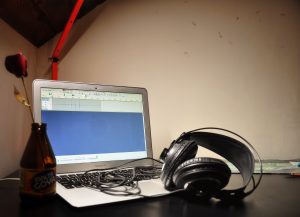By Kira Schukar
 The English Department Podcasting team met for the first time in early November. At 11:30, the group of office workers and newsletter editors opened the meeting, the sun shining in the background of everyone’s respective rooms.
The English Department Podcasting team met for the first time in early November. At 11:30, the group of office workers and newsletter editors opened the meeting, the sun shining in the background of everyone’s respective rooms.
Anna Chu ‘22 and Hilary Kaufman ‘23, two student workers who are co-producing the podcast, directed everyone to a meeting agenda on a Google Doc.
“I shared a Google Doc with some ideas and outlines,” said Anna. “Everyone can put their name under one of the roles at the bottom of the page.”
Anna Chu ‘22 started thinking about podcasts over the summer, when she interned with an exhibition called The Creative Process. Remotely, Anna edited interviews with artists and wrote interludes that connected her own experiences to those of the artists.
“It was amazing to hear these different artists talk about their experiences,” she said in an interview with The Words. “I love writing, and I loved finding angles to tie together my experiences with these different artists.”
As the summer came to a close, Anna turned her attention toward her new job in the Macalester English department. In the weeks before the beginning of the semester, Jan Beebe, the office coordinator, asked the student workers if they have any special talents to get an idea of what projects the department should tackle. As soon as Anna mentioned her internship, Jan set the department podcast into motion and put Anna in charge of the project. “Jan actually proposed the podcast idea!” Anna said. “And she collected all of us with interest in podcasts.”
When the English Department embarked on its podcast, the idea started hazily, the details ill-defined. Anna had a lot of experience with editing podcasts, but she was less familiar with planning, writing, and researching stories.
In early September, Jan invited Kori Suzuki—a Media and Cultural Studies and Environmental Studies double-major and host of the podcast Groveland—to walk the student workers through the basics of starting a new podcast. First on the agenda, he said, was deciding what kind of podcast the English Department would produce. Would it be made up of interviews? Long-form journalism? A talk show between two or three hosts? Podcasts, it turns out, come in all different genres, just like TV shows and books.
What’s more, each type of podcast takes a different skillset. Talk shows need energetic, charismatic hosts and detailed structure (think, Last Podcast on the Left). Journalistic podcasts take a lot of time to pre-plan, write, and edit, but most of the story comes from the interviewees (think, This American Life or Serial). And interviews? Interviews fall somewhere in between talk show and narrative: The host needs to move the conversation along and plan its direction, but the guest takes up a lot of the auditory space. Fresh Air and Code Switch both rely on this model. This type of podcast can take on a new theme every episode, or it can stay a little more consistent, inviting guests to talk about the same umbrella of subjects, but from different perspectives.
Once Kori had laid out these different podcasting models, the choice for the English Department was clear: The podcast would focus on interviews, with a handful of hosts asking questions and a team of editors, writers, and producers working behind the scenes to bring the conversations to listeners.
Now, just over two months into the semester, the hazy dream of a podcast was gathering sharpness at its edges. In the first official meeting of the podcast team, Anna showed off the idea section of the agenda document. She wanted to make the podcast accessible, but she also wanted to keep it well within the realm of the English department.
Anna talked about interviewing faculty and staff, or maybe different students in the department. Over the next hour, the team discussed logistics: How long would an episode be? Whose voices would appear on the podcast? Who would host, write, and produce the show?
From the initial seeds of ideas, the arc of each episode crystalized: The show would celebrate seniors, their work and interests, and their capstones. Two hosts would interview pairs of seniors and facilitate a conversation about…well, anything! Advice for new students, future plans, capstone projects, personal endeavors—all of it was on the table.
In the weeks leading up to winter break, the podcasting team will begin to interview seniors and edit conversations into accessible podcasts. If you’re a senior and interested in being interviewed, fill out the interviewee survey!